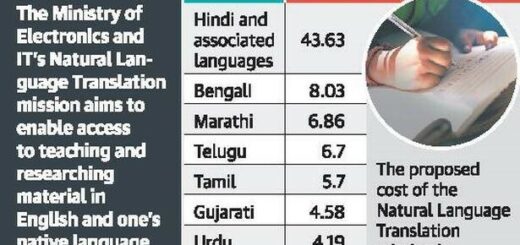National Current Affairs – UPSC/IAS Exams- 25th February 2020
Topic: Economy
In News: The Personal Data Protection (PDP) Bill, 2019 was referred to a joint parliamentary committee, which is currently engaged in a process of public consultation.
More on the Topic:
- The draft law is a comprehensive piece of legislation that seeks to give individuals greater control over how their personal data is collected, stored and used. Once passed, the law promises a huge improvement on current Indian privacy law.
- One of the more contentious issues in the law Bill are the provisions pertaining to “data localisation”.
- The phrase, which can refer to any restrictions on cross-border transfer of data (for instance, requirements to seek permission for transfer, the imposition of taxes for foreign transfers of data, etc.), has largely come to refer to the need to physically locate data within the country.
Arguments in favour of imposing stringent data localisation norms:
- Sovereignty and government functions; referring to the need to recognise Indian data as a resource to be used to further national interest (economically and strategically), and to enable enforcement of Indian law and state functions.
- Economic benefits: Data localization will create benefits to local industry in terms of creating local infrastructure, employment and contributions to the AI ecosystem.
- Protection of civil liberties: Local hosting of data will enhance its privacy and security by ensuring Indian law applies to the data and users can access local remedies.
Arguments Against Stringent Data Localisation:
- If data protection was required for these purposes, it would make sense to ensure that local copies were retained of all the categories of personal data provided for in the Bill (as was the case with the previous draft of the law).
- In the alternative, sectoral obligations would also suffice (as is currently the case with sectors such as digital payments data, certain types of telecom data, government data, etc.).
Test for Proportionality in the bill(As per SC guidelines-Privacy verdict):
Will data localisation lead to privacy protection?
- We note that the security of data is determined more by the technical measures, skills, cybersecurity protocols, etc. put in place rather than its mere location.
- Localisation may make it easier for domestic surveillance over citizens.
Enabler of better exercise of privacy by citizens:
- It may also enable the better exercise of privacy rights by Indian citizens against any form of unauthorised access to data, including by foreign intelligence.
- The degree of protection afforded to data will depend on the effectiveness of the applicable data protection regime.
Protecting privacy through less intrusive measures:
- Insofar as privacy is concerned, this could be equally protected through less intrusive, suitable and equally effective measures such as requirements for contractual conditions and using adequacy tests for the jurisdiction of the transfer.
- Such conditions are already provided for in the PDP Bill as a set of secondary conditions.
- The European Union’s General Data Protection Regulation too uses a similar framework.
- If privacy protection is the real consideration, individuals ought to be able to choose to store their data in any location which afford them the strongest privacy protections.
- It is arguable that data of Indians will continue to be more secure if stored and processed in the European Union or California.
- These two jurisdictions have strong data protection laws and advanced technical ecosystems.
Extra-territorial operation:
- The extraterritorial application of the PDP Bill also ensures that the data protection obligations under the law continue to exist even if the data is transferred outside the country.
Way Ahead:
- In order for localisation-related norms to bear fruit, either in terms of protecting citizen rights, enabling law enforcement access to data or enabling the development of the local economy, there has to be broader thinking at the policy level.
- Emphasis must be put on the following areas
- Reforming surveillance-related laws,
- Entering into more detailed and up-to-date mutual legal assistance treaties,
- Enabling the development of sufficient digital infrastructure, and
- Creating appropriate data-sharing policies that preserve privacy and other third party rights, while enabling data to be used for socially useful purposes.
Source: Hindu
Topic: Science and Technology
In News: Carbon more than 8,000 years old has been found inside the world’s deepest blue hole named the Yongle Blue Hole (YBH) which was recently discovered in the South China Sea.
More on the Topic:
- Blue holes are marine caverns filled with water and are formed following dissolution of carbonate rocks, usually under the influence of global sea level rise or fall. What distinguishes them from other aquatic caverns is that they are isolated from the ocean and don’t receive fresh rainwater.
- They are generally circular, steep-walled and open to surface.
Significance of the discovery:
- Discovered concentrations of carbon, usually found in deep marine holes like YBH, provide a natural laboratory to study carbon cycling and potential mechanisms controlling it in the marine ecosystem.
- Though a largely enclosed geomorphology, YBH is influenced with some oceanic exchange in the surface water. However, like most blue holes, it is anoxic e. depleted of dissolved oxygen below a certain depth. This anaerobic environment is unfavorable for most sea life.
- Low oxygen environments are an area of wide research in the aquatic ecosystem. Such anoxic ecosystems are considered a critical environmental and ecological issue as they have led to several mass extinctions.
- The transition from aerobic to anaerobic environment adversely affects the biogeo-chemistry of the ocean. However, in blue holes, the transition happens within several hundred metres depth with lesser influences.
- This makes blue hole ecosystem a more accessible habitat to examine the physical and biological processes affecting carbon cycling and unusual ocean conditions.
Source: Down to Earth
Dip in Ground Water Level: Bihar
Topic: Environment and Ecology
In News: Groundwater levels reportedly have dipped in 11 of Bihar’s 38 districts despite a good monsoon in 2019. The state is predominantly dependent on agriculture.
More on the topic:
- One of the main reasons behind this situation is that the general masses as well as farmers are slowly getting heavily dependent on groundwater for potable water to irrigation purposes. They are over-exploiting groundwater.
- Farmers also still depend on flood irrigation instead of using drip irrigation or sprinklers.
- Forest cover is also depleting in an accelerated pace.
Government- Actions Taken:
- The government is removing encroachments from near water bodies, renovating thousands of tanks, canals and traditional water sources.
- Government also planned to clean ponds, renovate wells, ahar-pynes, construct soak pits and check dams on small rivers by 2022.
- Jal-Jivan Hariyali programmehas been envisaged in this regard.
Source: Hindu
Topic: e- Governance
In News: The Ministry of Corporate Affairs has launched SPICe+ web form.
More on the Topic:
- It would offer 10 services by 3 Central Govt Ministries & Departments (Ministry of Corporate Affairs, Ministry of Labour & Department of Revenue in the Ministry of Finance) and One State Government (Maharashtra).
- It saves as many procedures, time and cost for Starting a Business in India and would be applicable for all new company incorporations.
- SPICe+ would be an integrated Web Form.
- It would have two parts, Part A-for Name reservation for new companies and Part B offering a bouquet of services viz.
- Registration for Profession Tax shall also be mandatory for all new companies to be incorporated in the State of Maharashtra through SPICe+.
- All new companies incorporated through SPICe+ would also be mandatorily required to apply for opening the company’s Bank account through the AGILE-PRO linked web form.
Source: The Hindu
Topic: Art and Culture
In News: The Archaeological Survey of India (ASI) will strengthen the stone chariot inside Vittala Temple complex at the UNESCO World Heritage site of Hampi to protect it from damage.
More on the Topic:
- Hampi is the 14th century capital of the Vijayanagar Empire, located in the Tungabhadra basin in Bellary District, Central Karnataka.
- Vittal Temple Complex is the best example of Vijaynagar Temple Architecture.
- A large number of royal buildings were raised by Krishnadeva Raya (A.D. 1509-30) and Vittal Temple Complex is one of them.
- Temples of Hampi are noted for their large dimensions, florid ornamentation, bold and delicate carvings and stately pillars which include subjects from the Ramayana and the Mahabharata.
- Majority of these temples in Hampi were provided with widespread bazaars flanked on either side by storied Mandapas.
- The Mahanavami Dibba, a variety of ponds and tanks, and the row of pillared Mandapas are some of the important architectural remains of Hampi.
- In 1986, Hampi was declared a World Heritage site by UNESCO.
Source: Hindu
Topic: Environment and Ecology
In News: Rushikulya rookery on the Odisha coast is being prepared by officials to welcome and protect olive ridley turtles during mass nesting.
More on the Topic:
- Olive Ridley Turtles are the smallest and most abundant of all sea turtles found in the world, inhabiting warm waters of the Pacific, Atlantic and Indian oceans.
- These turtles, along with the Kemps ridley turtle, are best known for their unique mass nesting called Arribada (mass-nesting event when thousands of turtles come ashore at the same time to lay eggs on the same).
- They are carnivores.
- The accidental killing of adult turtles through entanglement in trawl nets and gill nets due to uncontrolled fishing during their mating season around nesting beaches is the major threat to these turtles.
- The Odisha government has made it mandatory for trawls to use Turtle Excluder Devices (TEDs), a net specially designed with an exit cover which allows the turtles to escape while retaining the catch.
Protection Status:
- Vulnerable according to the International Union for Conservation of Nature and Natural Resources (IUCN).
- Listed in Appendix I of CITES.
- Under Schedule I of the Wildlife Protection Act, 1972.
Source: Hindu


















